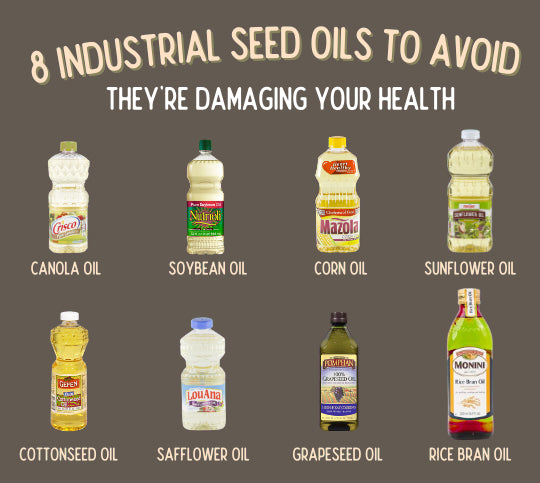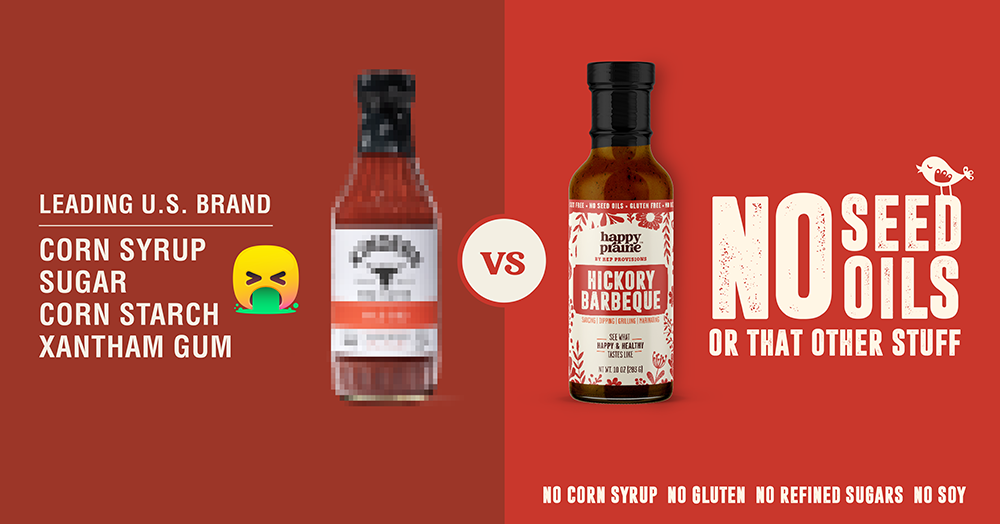A Brief History of Seed Oils.
Over the past century our consumption of seed oils has risen dramatically, especially in regards to soybean oil. Today seed oils are in everything from packaged snacks to marinades to nut milks to plant-based meats.
Americans’ massive shift in diet was heavily influenced by Procter & Gamble, originally a soap and candle making duo, who rose to a household name with the advent of Crisco. In the 1940’s P&G donated $1.5 million dollars to the American Heart Association (AHA), effectively allowing the organization to go national.
Throughout the 50’s a body of research emerged in support of Dr. Ancel Keys diet-heart hypothesis, claiming replacing saturated fats with vegetable oils reduces the risk of cardiovascular disease, by reducing LDL “bad” cholesterol.
Shortly after, the AHA recommended polyunsaturated fats (PUFAs), like vegetable oils to replace traditional saturated fats like butter, suet, tallow, and lard. Subsequently, dietary consumption of omega-6 polyunsaturated fats skyrocketed. Today in the Western world they constitute 8-10% of our total energy intake.
However, it’s important to note the earlier studies were intended to prove the heart-diet hypothesis and researchers were likely impacted by confirmation bias. Modern statistical analysis has effectively debunked the original research used by the AHA in formulating their dietary guidelines regarding reduced intake of saturated fat.
In fact, new research supports the exact opposite claim. Higher omega-6 intake from industrial seed oils consistently increases the risk of many chronic Western diseases including cardiovascular disease, diabetes, obesity, and many others.

What are Seed Oils?
Seed oils are a type of vegetable oil derived specifically from the seeds of plants. Many seed oils are high in polyunsaturated fats (PUFAs), a type of fat that has two or more double bonds in its fatty acid carbon chain.
The more double bonds a fatty acid has, the more molecularly unstable and prone to oxidation (rancidity) it becomes. All of the industrial seed oils listed below contain particularly high levels of an omega-6 fatty acid called linoleic acid.
Cate Shanahan, MD, is the scientist who identified the eight seed oils above as uniquely toxic and coined the term the Hateful Eight so anyone could easily identify the problematic oils. Learn more about the project here.
- Sunflower oil (66% linoleic acid)
- Corn oil (60% linoleic acid)
- Canola oil (21% linoleic acid)
- Cottonseed oil (53% linoleic acid)
- Soybean oil (55% linoleic acid)
- Safflower oil (71% linoleic acid)
- Grapeseed oil (71% linoleic acid)
- Rice Bran oil (30% linoleic acid)
Although we need a small amount of linoleic acid to survive, developing a deficiency is nearly impossible. For the first time in human history, we’re consuming these oils in excess and reaping the unintended consequences.

So… Are Seed Oils Bad for You?
1. It’s About Balance.
- Human beings evolved on a diet with a 1:1 ratio of n-6/n-3 fatty acids. In Western society today we’re eating up to 20 times more omega-6’s than omega-3 fats.
- Research links diets higher in omega-6’s, particularly linoleic acid, to diseases including chronic inflammation, cancer, heart disease, Alzheimers, obesity, diabetes, and other forms of neurological and psychiatric issues.
- You would have to eat salmon and other omega-3 rich seafoods at every meal to counter the sky-high amounts of omega-6 in our diet today.

2. Seed Oils are Highly Processed.
- Industrial manufacturers use high temperatures, mechanical pressure, chemical deodorizers, and petroleum-based solvents to extract oils from seeds. This effectively strips the oil of nutrients and antioxidants while creating harmful trans-fats.
- Industrial manufacturers also add synthetic chemicals like TBHQ, BHA, and BHT in efforts to extend shelf life and prevent oxidation. These known carcinogens have been banned by Japan, Europe, Canada, Australia, and New Zealand.
3. Seed Oils Cause Oxidative Stress in the Body.
- Seed oils high in omega-6’s are highly reactive and susceptible to rancidity. Many industrial seed oils are considered to be toxic.
- Consuming large quantities of seed oils creates an imbalance between free radicals (molecules missing an electron) and antioxidants in your body.
- High concentrations of free radicals in the body cause cellular damage leading to debilitating diseases like cancer, diabetes, Parkinson’s disease, cardiovascular diseases, cataracts, asthma, hypertension, arthritis, and Alzheimer’s disease.
- Seed oils are actually changing the molecular composition of our cells. One study suggests from 1959 to 2008 our fat cell composition of linoleic acid increased 2.5-fold, reflecting our change in diet. This means our bodies and cells themselves are more vulnerable to oxidation and rancidity.
4. Seed Oils Contain Trans-Fats.
- Although trans-fats do occur in nature, they’re being consumed at a much higher rate than ever before in history. Trans-fats elevate LDL “bad” cholesterol and majorly increase your risk for coronary disease.
5. Seed Oil Crops are Frequently Genetically Modified.
- Genetically modified (GM) crops are often sprayed with harmful herbicides, like glyphosate. The International Agency for Research on Cancer (IARC) declared glyphosate as a, “probable human carcinogen” in 2015.
- Ag-giants like Bayer/Monsanto have already paid $11 billion to settle cancer lawsuits, the most common being non-Hodgkin’s lymphoma. There are still 30,000 lawsuits pending.
6. Seed Oils Negatively Impact Male Fertility.
- Nearly 50% of infertility cases are associated with male infertility. Studies found men who were infertile had more than 2x the omega-6/3 ratio in their blood and sperm as compared to fertile men.
- Another study found 4-hydroxynonenal, a toxic byproduct of omega-6 fatty acids, damages human sperm.
- Higher intake of omega-3 fatty acids positively correlated with greater sperm concentration, motility, and morphology.
7. Seed Oils May Impact Maternal and Fetal Health in Pregnant Women.
- Pregnant rats fed a high linoleic acid diet had higher placental linoleic acid concentration and lower levels of the omega–3 DHA than the control group. DHA is a major fat important for fetal brain development and cognitive function.
- An animal study found linoleic acid intake during late stages of pregnancy increased risk of preterm labor.
- Ultimately, more research is needed to understand how seed oil consumption impacts pregnancy outcomes and fetal health in pregnant women.
How Can I Reduce Seed Oils and High Linoleic Acid in my Diet?
Avoiding industrial seed oils can feel overwhelming, but don’t panic. Choosing companies like REP Provisions who provide transparency, quality assurance, and tangible climate action make eating healthy easy.
With REP Provisions Happy Prairie sauces and marinades, you can still enjoy your favorite dishes while keeping your linoleic acid intake low. Our sauces are clean, delicious, and simple. No soy. No gluten. No refined sugars. No corn syrup. No MSG. No Monocultures. Just see for yourself.
BUY TODAY
And don’t stop at our sauces. Grocery store meats have notoriously high omega-6:omega-3 fatty acid ratios. This is because conventional agriculture feeds animals unnatural diets of corn, soy, and other grains high in pro-inflammatory omega-6 fatty acids.
Because our beef, bison, and lamb are 100% grass-fed and finished as nature intended, our regenerative meats boast the perfect 1:1 omega-3:omega-6 fatty acid ratio. When you bundle a regenerative meat box with our happy prairies sauces you’re making clean eating oh so simple.
Learn more about why our meats are healthier & continue reading about how seed oils hurt the planet.









Comments (16)
I was diagnosed with Parkinson’s disease four years ago. For over two years, I relied on Levodopa and several other medications, but unfortunately, the symptoms kept getting worse. The tremors became more noticeable, and my balance and mobility started to decline quickly. Last year, out of desperation and hope, I decided to try a herbal treatment program from NaturePath Herbal Clinic.
Honestly, I was skeptical at first, but within a few months of starting the treatment, I began to notice real changes. My movements became smoother, the tremors subsided, and I felt steadier on my feet. Incredibly, I also regained much of my energy and confidence. It’s been a life-changing experience I feel more like myself again, better than I’ve felt in years.If you or a loved one is struggling with Parkinson’s disease, I truly recommend looking into their natural approach. You can visit their website at ww w. naturepathherbalclinic .c om.
This source is so unreliable. The meat is so bad and so hard, it is so hard to chew and I’m not ok with that. And please tell me why all of the comments are from the same day. And when you look at the reviews they are horrible. Take this website DOWN.
If seed oils are organic does that decrease the amount of a processed food, and are there less omega 6 present in organic seed oils ?
This was great, I have been researching for a while now, and I think this has helped. Have you ever come across bine health center . com PD-5 Programme (just google it). It is a smashing one of a kind product for reversing Parkinson’s disease completely. Ive heard some decent things about it and my HWP got amazing success with it.
My husband had PD-5 programme about 4 months ago. he sleeps soundly, works out frequently, and is now very active. It doesn’t make the Parkinson’s go away but it did give him better quality of life. I’m surprised a lot of PWP haven’t heard of it, we got the treatment from bine health center . com
Very interesting
What studies have been done on all this?
Great article.. very informative and educational. I would try your products and meats.
Our food industry is poisoning us a little oil at a time. Thus, under the “guidance” of the FDA with a blind eye. Reading each and every label is essential to the enlightenment of good health eating habits. Thanks REP for stepping up. Send P & G President a certified pubic notice stating the facts. Larry Hall, Vet in Ohio
How do we verify your statements